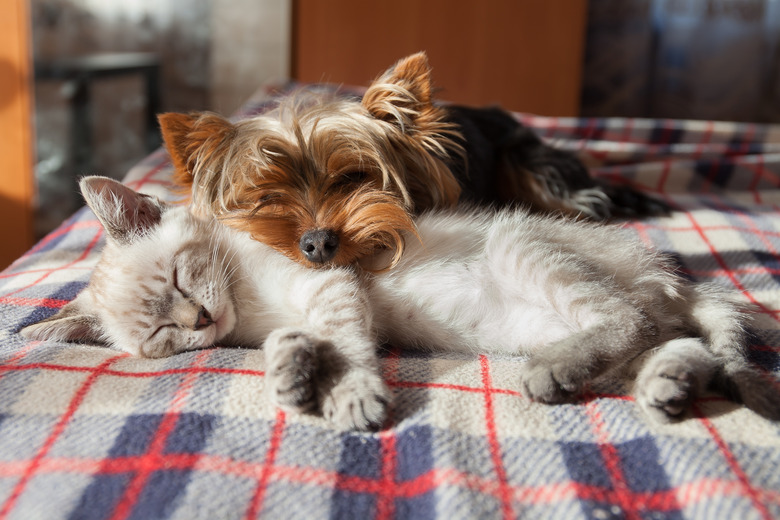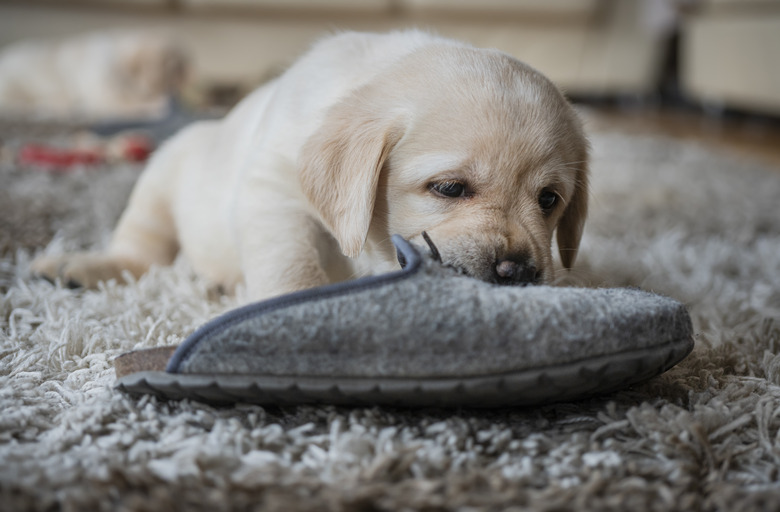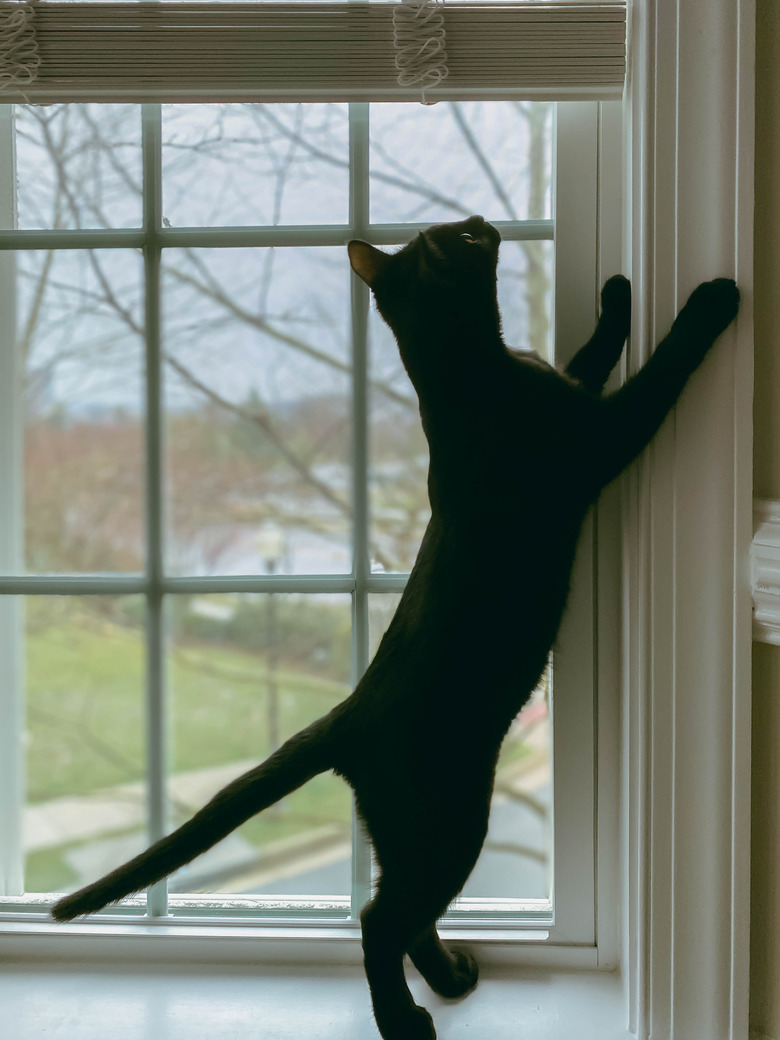How To Keep Pets Safe — The Essential Guide To Pet Safety At Home
We may receive a commission on purchases made from links.
Pet safety is important, largely because pets are a lot like small children — they're adorable and sweet (most of the time), but they don't understand the potential dangers in the world around them. This lack of understanding can get them into trouble quickly (especially precocious puppies or curious kittens), making it a pet owner's job to try and petproof the house to keep it safe.
Following some essential pet safety tips will help keep your pet out of harm's way and make your home a pet-friendly paradise for them to awe you with their cuteness for years to come.
Know That Your House Is Toxic to Pets
Know That Your House Is Toxic to Pets
There are lots of everyday items throughout your home that can harm pets — and many are found in the kitchen.
People foods like grapes, chocolate, raisins and yeast can all make pets sick. The artificial sweetener xylitol, often found in sugar-free gum and foods, is particularly lethal to both dogs and cats. Keep food in drawers and cupboards rather than on kitchen countertops where cats and resourceful dogs may find it. It's also smart to use a trash can with a secure lid so that your pets don't find these items after you throw them away or eat other things from the trash that they shouldn't consume.
Houseplants are sometimes toxic for dogs and cats. Some will make them sick (like poinsettias during the holiday season) while others can cause death. Toxic plants include but are not limited to lilies, asparagus ferns, aloe plants, amaryllis and heartleaf philodendron. If you're unsure about a plant, talk to your vet or visit the American Society for the Prevention of Cruelty to Animals website, where you can find an extensive list of poisonous plants. Fortunately, there are many safe plants from which to choose.
Medications are another risky item found in many homes. Keep your medications in a medicine cabinet or in other areas your pet can't reach. This is obviously true for over-the-counter medications that come in cardboard boxes and blister packs but don't count on prescription bottles to keep your pets safe either. Our furry friends are very resourceful when they want something they shouldn't have.
Keep Things Tidy
Keep Things Tidy
If we could ask them, dogs and cats would likely both tell us that anything they find on the floor is fair game. This is especially true of laundry, with many dogs scarfing down socks and other clothing items left on the floor. Even cats have been caught chewing the buttons off shirts or fraying the ends of shoelaces at playtime.
To keep your clothes intact and your pets out of the vet's office, place shoes and slippers in a closet if you can. If not, get a shoe rack for your mudroom or entryway and store shoes on top of it and out of reach. Laundry should always be tucked away in a hamper.
Clean up children's toys thoroughly. The only thing more painful than stepping on a LEGO is paying to have one surgically removed from your pet's stomach. Toys also create a choking hazard. After play, make sure all of the toys find their way back to the toy box. Taking the time to tidy up will keep your house clean and protect your pets.
Eliminate Dangerous Chemicals
Eliminate Dangerous Chemicals
There are lots of potentially dangerous chemicals in your home, and it's important to store them away from pets. Fertilizers, cleaning supplies, rock salt, antifreeze, insecticides and other chemicals can make your pet very sick — or worse.
When using pest control products or traps in your home, do so carefully. Use only pet-safe bait stations with completely enclosed pesticide rather than traditional snap traps or poison containers. When using spray chemicals to treat the home, keep your pet out of the area until the spray has dried completely. When feasible, opt for products labeled as safe for pets.
Keep these chemicals in a garage or basement area where you can shut the door and keep your furry creatures out. Place the chemicals up high so pets can't reach them if they do get into the room. Given that cats jump and climb well, a high shelf may not deter them. In that case, place your chemicals inside a cabinet and install a childproof latch.
Watch Water Hazards
Watch Water Hazards
If you have a swimming pool in your yard, take some pet safety precautions to keep your pet safe. Local ordinances likely require you to put a fence around your pool anyway, but consider adding another section of fence between the pool and your house. Install a gate alarm in the fence so you know if the gate opens.
Your cat will probably not want to get involved with all that water. Make sure your dog can swim, however, and teach him how to get out of the pool. This way, he won't panic if he falls in. If your cat does turn out to be a swimmer, make sure she knows how to find and use the pool steps as well.
Remember that water hazards exist inside as well as outside. Keep your toilet lid closed so that cats and small dogs don't drown while trying to drink from the toilet. Admittedly, watching your cat drink from the toilet is actually pretty entertaining, but it's a habit you should discourage. Don't leave a bathtub with water in it unattended either.
Beware of Electrical Dangers
Beware of Electrical Dangers
Your new kitten isn't likely to stick his tongue in an electrical outlet, but a basic pet safety tip is to address electrical issues. The electrical outlet itself won't hold much fascination for your pet, but electrical cords are paradise for many dogs and cats. You can bat them around, chew on them, knot them up — what's not to love?
The easiest way to keep pets away from cords is to wrap them in flexible tubing or stash them in a wall-mounted cord cover. This will keep your pet from shocking herself and will prevent the fire hazard a chewed cord presents.
Essential Oils and Potpourri
Essential Oils and Potpourri
You may enjoy the soothing odors of essential oils wafting out of a diffuser, but your pet may disagree. You should never use these oils around birds, and many are toxic to dogs and cats. Cats are especially sensitive to the oils and find cinnamon, ylang-ylang, pine, peppermint, eucalyptus and several other oils toxic. Oils toxic to dogs include pine, tea tree, wintergreen and pennyroyal.
Even if you choose oils and potpourris with nontoxic ingredients, exercise caution when using them. Make sure your pets have an escape route and can easily leave the room if the smell is too much for them. Keep a particularly close eye on your dog. Your cat will probably wander off if he dislikes the smell, but some dog breeds will endure anything to stay by your side. If your dog coughs, sneezes or otherwise reacts to the fragrance, remove her from the room or get rid of the odor from the oil.
If It Hangs, It's Gone
If It Hangs, It's Gone
That tablecloth may look quite elegant to you, but to a cat or puppy, it just looks like fun. When tablecloths hang down over the edge of the table, dogs and cats are sometimes tempted to play with them, possibly pulling whatever is on the table down onto the floor — or onto themselves.
Another common hanging hazard is the cords on window blinds. Pets and small children both get tangled in these cords, creating a potentially dangerous situation. To avoid problems, it's best to replace your blinds with cordless options. Barring that, keep window cords as short as possible and tether them to the wall so they don't hang.
Be Ready for Anything
Be Ready for Anything
It's important to keep pets safe at home but make a plan and know what you'll do in an emergency if you and your pet can't stay home. Have a bag of medications, food, water, dishes and other necessities ready in case you and your pet need to evacuate your home for some reason.
Before disaster strikes, call around and ask local shelters and relief organizations if they allow pets and know the rules for bringing them. If you can't find a shelter that takes pets, see if your veterinarian will take your animal or find a friend who can take your pets for you. Choose a friend who lives close enough to reach but not so close that she might have to evacuate too.
If you haven't already, purchase an identification tag for your pet that includes your contact information and have them microchipped. Hopefully, you'll never lose him. If you do get separated during an emergency, however, a chip makes it much easier to reunite with you.
References
- The New York Times Wirecutter: Are Essential Oils Safe for Pets?
- American Society for the Prevention of Cruelty to Animals: People Foods to Avoid Feeding Your Pets
- LAHomes.com: How to Keep Pets Safe at Home
- American Society for the Prevention of Cruelty to Animals: Poisonous Plants
- Window Covering Safety Council: Window Covering Cord Safety
- American Humane: Pet-Proofing Your Home


